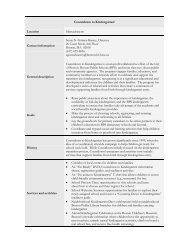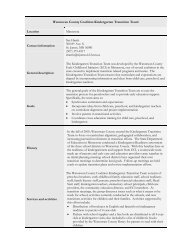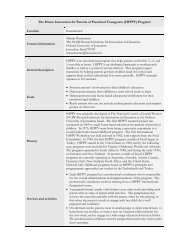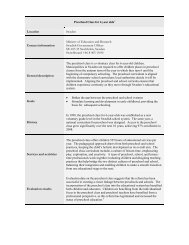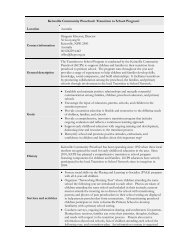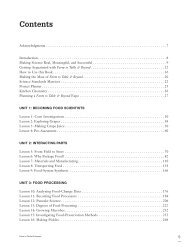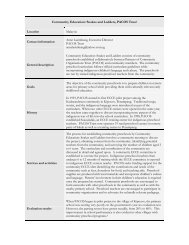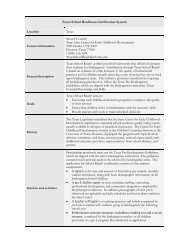Proceedings of the Fourth Annual Teachers College Educational ...
Proceedings of the Fourth Annual Teachers College Educational ...
Proceedings of the Fourth Annual Teachers College Educational ...
You also want an ePaper? Increase the reach of your titles
YUMPU automatically turns print PDFs into web optimized ePapers that Google loves.
Cooperative Inquiry in Designing Technology in Life-Relevant<br />
Learning for Science<br />
Jason C. Yip, Tamara Lynnette Clegg, Allison J. Druin, Mona Leigh Guha, Evan Golub, Elizabeth<br />
Bonsignore, Elizabeth Foss, and Greg Walsh<br />
University <strong>of</strong> Maryland – <strong>College</strong> Park, Human-Computer Interaction Lab<br />
2117 Hornbake Bldg, South Wing, <strong>College</strong> Park, MD 20742<br />
Email: jasonyip@umd.edu, tclegg@umd.edu, allisond@umd.edu, mona@umd.edu, egolub@umd.edu,<br />
ebonsign@umd.edu, efoss@umd.edu, gwalsh@umd.edu<br />
Abstract: In this presentation, we <strong>of</strong>fer an approach to designing supporting technologies<br />
for science learning in everyday informal contexts. We advocate for Cooperative Inquiry<br />
as a means <strong>of</strong> engaging learners in <strong>the</strong> development and design <strong>of</strong> <strong>the</strong>ir learning<br />
activities and supporting tools. Our participatory design approach focuses on actively<br />
engaging researchers and children in setting design goals, planning prototypes, and<br />
making decisions, ensuring <strong>the</strong> final design meets <strong>the</strong> needs <strong>of</strong> <strong>the</strong> end users. We outline<br />
<strong>the</strong> results from two case studies <strong>of</strong> design sessions with members from a design team<br />
(Kidsteam) and participants <strong>of</strong> a summer science program (Kitchen Chemistry). We<br />
present <strong>the</strong> methodological steps we adopted to co-designing early prototypes, what<br />
features learners find important in <strong>the</strong> technology for <strong>the</strong>ir personal interests, and what<br />
implications can be made for designing technology for everyday learning.<br />
Introduction<br />
National goals emphasize “science for all” (e.g., AAAS, 1990). However, science can <strong>of</strong>ten be presented<br />
as abstract facts that are disconnected from learners’ daily lives. Subsequently, studies indicate that<br />
many learners can be turned <strong>of</strong>f from this form <strong>of</strong> science learning (e.g., Atwater, 1996). One approach to<br />
addressing this challenge is to help learners engage in scientific practice in <strong>the</strong> context <strong>of</strong> <strong>the</strong>ir own<br />
personal interests. Therefore, we aim to design learning environments called life-relevant learning (LRL).<br />
We define LRL as engaging learners in science through <strong>the</strong> pursuit <strong>of</strong> <strong>the</strong>ir own meaningful goals. Our<br />
LRL environment, Kitchen Chemistry (KC), is an out-<strong>of</strong>-school program where participants engage in<br />
scientific practice in <strong>the</strong> everyday context <strong>of</strong> cooking. In this LRL environment, we have found that<br />
learners engage scientifically in new ways (Chinn & Malhotra, 2002) that promote <strong>the</strong>ir scientific identity<br />
development (e.g., Clegg, Gardner, & Kolodner, 2010) and informed decision-making practices (Yip et al.,<br />
2012).<br />
While technology can help address <strong>the</strong> challenges learners face in LRL environments, <strong>the</strong>se tools also<br />
need to support science learning in <strong>the</strong> context <strong>of</strong> learners’ own personal interests. We contend that in<br />
order to design LRL technologies that promote scientifically meaningful experiences in everyday contexts,<br />
we need to capitalize on learners’ personal goals. Therefore, we advocate for Cooperative Inquiry (CI) as<br />
a means <strong>of</strong> engaging learners in <strong>the</strong> development <strong>of</strong> <strong>the</strong> supporting tools (e.g., Druin et al., 2001). CI is a<br />
participatory design approach created for designing technology for children with children. Our CI<br />
approach focuses on actively engaging researchers and children in setting design goals, planning<br />
prototypes, and making decisions to ensure <strong>the</strong> final design meets <strong>the</strong> needs <strong>of</strong> <strong>the</strong> end users. While CI<br />
provides a way for developing user-centered technology, few studies have focused on co-designing with<br />
children to develop technological tools to help make science learning more personal. For this study, we<br />
aim to better understand two questions: (1) how can technology be better designed to meet participants’<br />
learning and practical needs in LRL experiences? and (2) how can we structure <strong>the</strong> CI process for<br />
designing technology for LRL experiences?<br />
Methods<br />
To answer <strong>the</strong>se questions, we worked with two different groups <strong>of</strong> children and adults. The first group<br />
was composed <strong>of</strong> <strong>the</strong> eight children (four boys, four girls, ages 7–11) and researchers <strong>of</strong> Kidsteam, an<br />
out-<strong>of</strong>-school program at <strong>the</strong> University <strong>of</strong> Maryland’s Human-Computer Interaction Lab. Throughout <strong>the</strong><br />
year, <strong>the</strong> team develops, evaluates, and co-designs new technologies for children. We chose <strong>the</strong><br />
82



